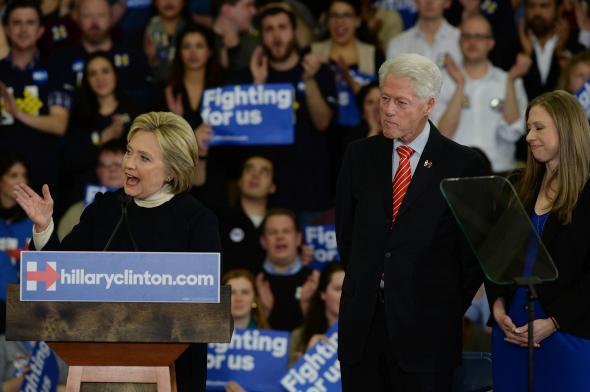In the midst of her concession speech on Tuesday night, Democratic presidential candidate Hillary Clinton pivoted to a seemingly impromptu aside about Citizens United v. FEC, the Supreme Court decision allowing corporations to spend unlimited sums electioneering. “Sen. Sanders and I both want to get secret, unaccountable money out of politics,” Clinton began:
And let’s remember, Citizens United, one of the worst Supreme Court decisions in our country’s history, was actually a case about a right-wing attack on me and my campaign. A right-wing organization took aim at me and ended up damaging our entire democracy. So, yes, you’re not going to find anybody more committed to aggressive campaign finance reform than me.
The line received a huge applause. It was one of the worst Clinton has ever uttered.
There are three really good reasons to hate Citizens United. The first is that the decision ignores the “appearance of corruption” that can result when corporations spend massive amounts of money trying to elect their preferred candidates. (When Exxon spends millions electing a senator, then that senator votes for a bill favorable to Exxon, nobody thinks he’s doing it out of political principle.) The second is that endless corporate electioneering can have “corrosive and distorting effects” on democracy, giving corporations “an unfair advantage in the political marketplace” by drowning out ordinary citizens’ voices. (That was the chief reasoning of the court in Austin v. Michigan Chamber of Commerce, which Citizens United overruled.) Finally, the decision rejected the notion that corporate election spending should be limited to protect shareholders from being forced to fund causes they don’t agree with, thereby violating their right of association. (Oddly enough, the same five justices who dismissed that concern with regard to corporations are deeply convinced that unions might violate freedom of association by forcing nonmembers to fund causes they don’t agree with.)
Instead of relying on these rationales, Clinton concocted a fourth: Citizens United was bad because it let a corporation attack my candidacy. The decision’s defenders jumped immediately. (“Hillary Clinton: Citizens United Is Tragic for America Because It Allowed People to Criticize Me,” blared one Reason headline.) And rightly so: Clinton seemed to confirm everything Citizens United apologists have been saying for years. She essentially acknowledged that she hated the ruling because it allowed a corporation to disseminate harshly disparaging speech against her. But protection for harshly disparaging political speech is the bedrock of the First Amendment. The real problem with Citizens United was not the speech itself, but the way it was funded. By admitting that her real problem with the ruling was the content of the speech it allowed, Clinton confirmed the fears of the Citizens United majority: that a limit on corporate electioneering “uses censorship to control thought.” In attempting to criticize the decision, she inadvertently proved why it might actually be right.
The Democratic base probably won’t care that Clinton botched her Citizens United line—but the error could come back to haunt her during the general election. Ted Cruz has mounted a compelling defense of the ruling, implying that its detractors don’t fear money in politics as much as they fear public opprobrium from well-funded opponents. Fear of public opprobrium, as Cruz well knows, is not a valid reason to limit free speech—yet it seems to be the reason Clinton hates Citizens United. And her remarks on Tuesday made it alarmingly easy to imagine Cruz framing Clinton as a Constitution-trashing censor on the debate stage this fall.
